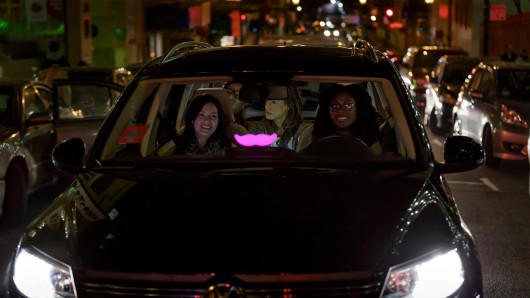
Lyft is a San Francisco-based ride-hailing company. Credit: Courtesy of Lyft.
A little more than a year after suspending operations in Ohio’s capital city because of increased regulation of peer-to-peer transportation options, ride-hailing service Lyft has returned to Columbus.
The San Francisco-based company, known for its playful, bright pink mustache logo, originally launched in Columbus in February 2014 as a peer-to-peer transport network company that hires drivers to use their personal vehicles to transport customers throughout the city. The service uses a smartphone app to connect riders and drivers, and customers pay for the ride using the credit card they have registered through the app.

A screenshot of the Lyft app. Credit: Courtesy of Lyft
Operations in Columbus are officially set to resume Thursday at noon, according to a Lyft press release. The company also announced that Lyft will be partnering with Port Columbus International Airport, as well as Rickenbacker International Airport.
Jaime Raczka, Columbus general manager of Lyft, said the company’s return to the city and its partnerships with the airports will provide the people of Columbus with a safe transportation option.
“We thank city, state and airport leaders for their collaborative efforts in bringing modern transportation options like Lyft to the city of Columbus and its airports,” Raczka said in an emailed statement.
Lyft decided to suspend operations in Columbus after the Columbus City Council announced a revision to the Business Regulation and Licensing Code, Title 5, in March 2014. Changes included incorporating peer-to-peer transportation networks, such as Lyft, Uber and Sidecar, into its existing vehicle for hire code.
“We are now forced to choose between endorsing rules that will make it exceedingly difficult for Lyft’s peer-to-peer model to thrive, or taking a stand for the right long-term path forward,” said Mary Caroline Pruitt, a Lyft spokeswoman, in a Lantern article published in January 2015, shortly after the company announced its suspension of services in an email to Columbus drivers.
Additions to the code included requiring peer-to-peer transportation companies to conduct background checks on its drivers and subject the vehicles to mechanical inspection. Under the revised code, Lyft and similar companies were also required to obtain a “Vehicle for Hire” owner’s license, and drivers were required to possess a “Vehicle for Hire” driver’s license issued by the Director of Public Safety.
According to requirements listed on the company’s website, Lyft drivers are screened for criminal offenses and driving accidents, and the vehicles used must pass an inspection before they can be driven for the service. Lyft also has other safety measures in place, Raczka said.
“We have a whole flow of customers and drivers actually rating each other after every single ride, a safety team that can respond to any sort of incident and a critical response line that is available 24/7 to address any issues that may come up,” she said in a follow-up interview Thursday afternoon.
Raczka said the decision to come back to Columbus was made after the Ohio General Assembly passed House Bill 237, which says that transportation network companies should be regulated at the state level.
The new legislation says the intent of the General Assembly is “to preempt any local ordinance, resolution, or other law adopted to license, register, tax, or otherwise regulate TNCs, TNC drivers, and TNC services.”
This means that new policies implemented at the state level overrule the legislation previously passed by the Columbus City Council that incited Lyft to suspend its operations in Columbus.
In celebration of its return, Lyft is offering new customers one free ride up to $20, redeemable with the use of the code “OHIO.” Returning users of Lyft’s app can enter the code “BUCKS” to receive $5 of credit.
Editor’s note: This article was updated on March 24 to include information about House Bill 237, as well as additional comments from Jaime Raczka.


